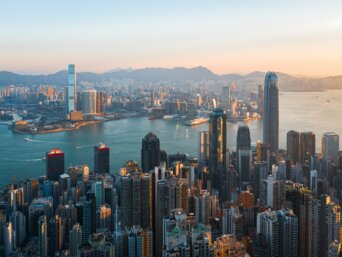- About
- Topics
- Picks
- Audio
- Story
- In-Depth
- Opinion
- News
- Donate
-
Signup for our newsletterOur Editors' Best Picks.Send
Read, Debate: Engage.
| topic: | Political violence |
|---|---|
| located: | Hong Kong, China |
| editor: | Sun Ma |
With its new Chief Executive taking office on 1st July this year, not only will Hong Kong enter a new era, but the students in the city will also see a revised edition of textbooks which states that the territory was never a British colony - a fact that contradicts the knowledge of most Hongkongers.
However, the textbooks do declare that the British exercised colonial rule over Hong Kong before 1997, which could be confusing. According to the teaching materials, if the country only owns the rights to govern without having sovereignty, it is exercising colonial rule over the area, but the territory does not constitute a colony.
As the Chinese government sees it, Hong Kong returned to the motherland 25 years ago, which implies it was not a transfer of sovereignty or a handover. According to the new textbooks, China has never lost sovereignty over Hong Kong but it was occupied by the British under unfair treaties.
Schools received four sets of the new books from different publishers for preview while they are still being vetted by the Education Bureau, all of which are in line with Beijing’s approach to strengthen the so-called Chinese identity of the next generation.
The books are designed for the newly developed subject of Citizenship and Social Development as part of the city’s efforts in national education. This subject replaced that of Liberal Studies, which was launched in 2009 to cultivate critical thinking among students but has come under fire in recent years. The authorities and pro-Beijing voices blamed it for stoking rebellion against the government, especially in the 2019 pro-democracy protests. Being framed as the source of radicalisation across the city, the subject of Liberal Studies was cancelled last year.
The new narratives have sparked controversies among educated people in Hong Kong since most of them learned the history of Hong Kong as a former British colony in school in the past. Contrary to popular opinion, China does have some historical background to make such a claim.
Following its defeat in the First Opium War in 1842, the Qing government agreed to cede Hong Kong in perpetuity, making it a British Crown Colony. Subsequently, Britain expanded its influence after the Second Opium War in 1860 and the First Sino-Japanese War until 1898, when Britain obtained a 99-year lease of the New Territories.
Nonetheless, after the founding of the People’s Republic of China proclaimed by Mao Zedong in 1949, the communists refused to succeed the diplomatic legacy of the old China, including the treaties signed.
Hong Kong was previously in the United Nations’ list of non-self-governing territories, which means it was dependent on colonial powers. In 1972, China maintained that Hong Kong and Macao were not colonies and they were stripped of their status as non-self-governing territories at the request of Chinese authorities, without discussion in the General Assembly.
In a talk with then-British Prime Minister Margaret Thatcher in 1982, Chinese leader Deng Xiaoping said, “The time is ripe for making it unequivocally clear that China will recover Hong Kong in 1997.”
Whether the new textbooks will be approved by the bureau is uncertain at the moment. What is certain, however, is that the authorities are trying to retell Hong Kong’s history.
Photo by Manson Yim

